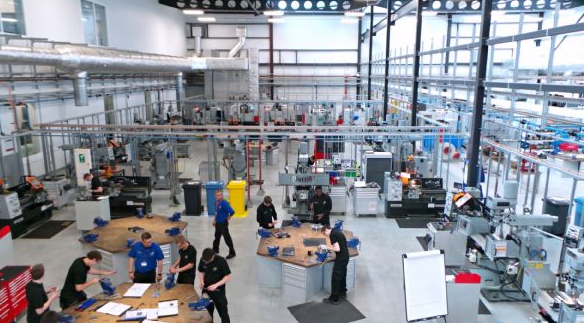The development of artificial intelligence (AI) technology has brought about a major shift in product design, supply and manufacturing, and has spawned the so-called smart factory operation. The comment pointed out that if manufacturers want to remain competitive, they must accept AI to help human intelligence, thereby improving production efficiency.
According to reports, AI has been rooted in various industries, of which manufacturing is no exception. AI enables medical devices, from electronics manufacturers and pharmaceutical companies, to leverage Big Data and Internet of Things (IoT) investments to discover new patterns and insights to perform tasks more efficiently and quickly.
The AI ​​algorithm will provide intelligent advice and work with workers on key decisions. When workers are free to focus on strategic tasks and let the AI ​​algorithm perform common tasks, it is expected to inspire innovation and increase efficiency and quality.

In the early 1910s, factory workers began working on assembly lines. In the mid-1950s and after the 1970s, industrial robots entered the factory but did not have real intelligence and limited operational functions, and could only perform repetitive tasks in a highly controlled environment. . By the 1980s, industrial robots began to be used in large numbers, and all technologies made producers run more efficiently.
Current AI-based software allows the machine to self-teach to maximize performance, identify the best processes, and train itself to achieve the desired results while meeting the Six Sigma standard. The growth of IoT, which collects data from sensors and feeds back critical information to the factory, also drives a new data-based vision for AI.
Wovenware has developed AI solutions for medical device manufacturers to collect sensor data from production processes and predict when line devices will not be repaired and must be discarded. The same AI is also used in other factories to predict manufacturing failures before the product is shipped.
Manufacturing data from IoT sensors and production execution systems is also used to develop custom, deep learning algorithms to identify defective products before they are delivered to customers, thereby reducing liability, replacement and warranty costs, and even saving lives.
AI also dramatically changes production through predictive maintenance, such as a technology that uses AI to determine when to perform machine repairs, thereby saving costs and improving operations. A pharmaceutical manufacturer also uses AI-driven robots to perform quality testing and screening, sorting and packaging of pills.
According to the Frost & Sullivan report, the development of intelligent and secure robots using machine learning technology will become dominant. Although humans still need to implement logical, rational and ethical decisions, the report points out that allowing machines to detect changing production situations and real-time The cognitive technology that responds will reduce the need for immediate intervention.
On the other hand, the Gartner report also pointed out that although AI will reduce 1.8 million jobs, it will create 2.3 million jobs by stimulating innovation and growth.
Shenzhen GEME electronics Co,.Ltd , https://www.gemesz.com